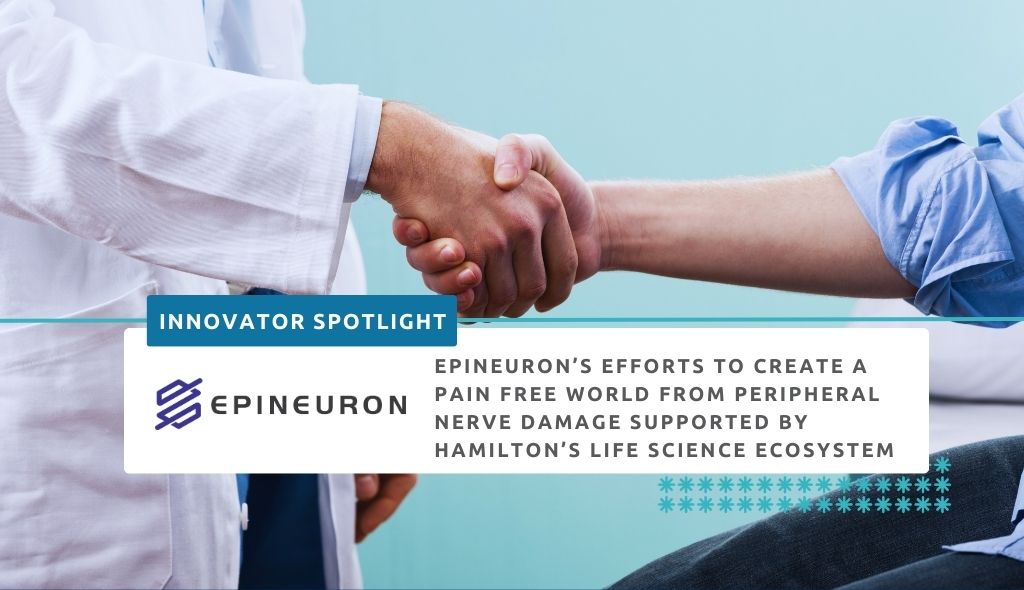Picture yourself sitting at your desk, diligently working away, when suddenly you’re hit with an unwelcome sensation—a persistent numbness and tingling in your hand. If this sounds all too familiar, you’re not alone. Approximately 5000 individuals per day experience some form of peripheral nerve injury like carpal tunnel syndrome. It can range from simply stretching or compressing a nerve to fully severing neural connections.
Peripheral nerves are all the nerves outside of our brain. It’s a vast and complex web of neural networks that runs throughout the human body. As common as peripheral injuries are, the current standard of care is fairly limited. The only solution is surgery, which does not always lead to a full functional recovery. This leaves patients with long-term pain and reduced function. Severe nerve injuries often result in long term debilitating consequences.
The team at Epineuron decided to take on this issue as a challenge. Understanding the unique ability of peripheral nerves to regenerate, helped the team formulate a solution. Using electrical stimulation to accelerate the process, the treatment is administered for one hour, right after surgery and helps activate regenerative genes, speeding up the recovery process. After a successful development process, Epineuron built PeriPulse™, a single-use device that is compact, wearable and easily removed.
In 2021, the Epineuron team applied to the Southern Ontario Pharmaceutical Innovation Ecosystem Program (SOPHIE) in partnership with Hamilton Health Sciences. This program helped Epineuron conduct additional clinical trials to collect evidence to accelerate its commercialization journey. The clinical trials explored the implementation of the device in different injury models and will assist with regulatory approvals. The company also oversaw human factor studies that were vital in finalizing the product’s design.
“The SOPHIE project was a strategic opportunity to enhance our novel hardware and solve user needs to deliver stimulation therapy more effectively,” says Sergio Aguirre, co-founder and CEO of Epineuron.
Delivered by Hamilton’s Innovation Factory, in collaboration with the Synapse Life Science Consortium, SOPHIE was launched in 2021 with a $6-million investment from the Government of Canada through the Federal Economic Development Agency for Southern Ontario (FedDev Ontario). SOPHIE supports high-potential life science companies and enables them to accelerate their path to market. To date, the program has supported 42 commercialization projects, and enabled $7.6 million in commercialization investment.
How Epineuron is defining success across the life science industry
Epineuron’s journey to success started at Innovation Factory’s 2019 Synapse Life Science Pitch Competition. The company was a participant and ultimately won the competition. Aguirre adds, “Participating in the Synapse competition allowed us to really hone in on some of the gaps we had internally and some of the challenges we had ahead. It helped us devise a more refined strategy and build a lot of credibility as we relayed our story to potential investors.” It is also where the team formed many valuable connections. One of the connections was Ing Goping, a Venture Growth Advisor at Innovation Factory. With some great coaching and advice from industry experts, Epineuron was able to attain financing that helped the team build their company.
Fast forward a few years and Epineuron has achieved many goals. Since enrolling in SOPHIE, it has secured five U.S. patents to date and has 15 underway. The company’s first in-human study was completed at two Hamilton hospitals—St. Joseph’s and Hamilton General, which helped in identifying strategic and production opportunities, broadening the scope of the product and improving the process of delivering therapy.
The Epineuron team has been able to secure a strong IP position and is actively seeking new data to support new indications of use. “Based on the success of the human pilot study and patent portfolio, we closed a significant Series A funding round in 2021 to ramp up our FDA pivotal trial in both Canada and the U.S,” says Aguirre. Epineuron is now also an ISO 13485-certified company, meaning that the team can now develop, design and manufacture their medical devices in house.
It is exciting to see how the team at Epineuron has grown over the years. Their dedication to advancing nerve regeneration will revolutionize the field and change the standard of care when dealing with nerve injuries. With its innovative solution and commitment to transforming lives, Epineuron is paving the way towards a pain-free and more functional future for individuals with peripheral nerve damage.
